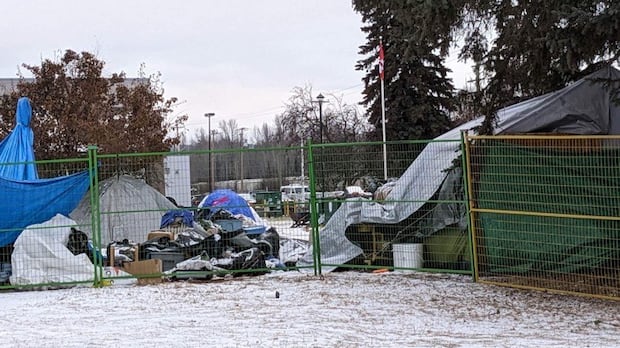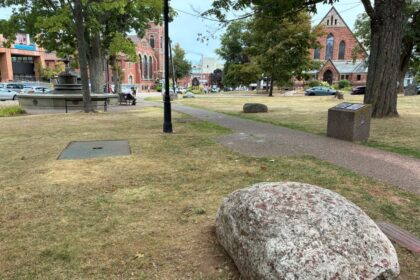British ColumbiaMany municipal leaders in many smaller towns are taking issue with how shelters are planned and approved by the province, saying a regional approach would be needed and not an ad hoc response.Lack of resources or regional plans and ad hoc nature of approval causes tensions, say local leadersJustin McElroy · CBC News · Posted: Nov 20, 2025 9:37 PM EST | Last Updated: 4 hours agoListen to this articleEstimated 5 minutesThe audio version of this article is generated by text-to-speech, a technology based on artificial intelligence.A homeless camp in Smithers, B.C., seen here in 2022, has grown in size to the point where the small town has required a shelter this winter — but the province’s shelter program has come under scrutiny by smaller communities. (Submitted)When a town of 5,500 people has more than 8,000 views on a Facebook video of its town hall, you know it’s dealing with controversy. “I fully understand why people are concerned,” said Smithers, B.C., Mayor Gladys Atrill, speaking about the town’s new emergency shelter that prompted a town hall on Monday for residents to air their opinions.“This temporary shelter, for lack of a better word, isn’t a long-term plan, not from our perspective.”In several smaller B.C. communities with growing homeless populations, the approval of shelters has recently been a contentious issue.WATCH | B.C.’s shelter program may need a rethink:Does B.C.’s shelter approval program need a rethink?A northern B.C. town with 5,000 people had 7,000 views for the livestream of a meeting about its new emergency shelter. But as Justin McElroy reports, it’s not the only place in B.C. that is having complicated arguments over its wintertime shelters. In Sidney, council voted against opening an extreme weather response shelter that would be open approximately 10 nights of the year, while Trail has been divided over the extension of a permit for its own shelter.Next Monday, Port Alberni council is expecting a heavy turnout on a vote to extend the permit for the Salvation Army’s shelter, which is the largest in the community.“I think we’ve been very privileged to have very little opposition in the past … but this one has been more challenging for our community,” Atrill said.“I’m certainly getting a sense of what other communities struggle with when they’re making these decisions.”LISTEN | Why approving shelter spaces in small towns can be contentious:The Early Edition8:08Metro Matters looks at the complexities of approving shelters in B.C. municipalitiesThere are only 5,000 or so people who live in the northern B.C. town of Smithers. But on Monday, they held a town hall and, on Facebook, a video of it has more than 7,000 views. The town hall was about a new homeless shelter that has just opened in town. To talk about the controversy, the complicated way shelters are approved across B.C. and if there’s a better way to create them, we’re joined by our Municipal Affairs Reporter Justin McElroy.Lack of ability to plan or engageAt issue for many municipal leaders in many smaller towns is how shelters are planned and approved by the province. While the B.C. government has multiple designations for types of shelters, typically they are planned and operated by local non-profits who bring proposals to provincial agency B.C. Housing, which then decides what to fund based on viable sites and other operational factors.Sometimes, the zoning of the shelter allows it to go forward automatically, as was the case in Smithers.Other times, as in Sidney or Port Alberni, it requires a council vote.But the end result is an ad hoc process that can repeat for many years — without the appearance to mayors of long-term funding or a regional strategy for creating more permanent spaces. “I understand why they exist, but it just really stops us from being able to properly plan for where these services should be — when it’s going to be potentially a different service provider every year competing for the funds in a different space,” said Port Alberni Mayor Sharie Minions.“It really does stop us from being able to go through a proper planning process, taking input and engagement from the community … when we know that if we say no to [a proposal], it’s not saying no to this temporary use permit, it may just leave our community in terms of funding altogether.”Port Alberni Mayor Sharie Minions says turning down a shelter could mean a community loses out on funding. (Justin McElroy/CBC)It’s why the Union of B.C. Municipalities passed a number of resolutions in its September convention on the current framework, including one for a regional approach to homelessness.“When you have a scarce resource like funding for shelter spaces, it really makes sense to us to deploy those resources across a region,” said UBCM President and Prince George Coun. Cari Ramsay.“It’s not just one size or municipality or local government being hit here. It’s everyone.”A resolution was passed at the Union of B.C. Municipalities conference asking for a regional approach to homelessness, and not an ad hoc approach from the province. (Ben Nelms/CBC)Shelter spaces up 7% from last yearBut the current system seems unlikely to change. “The [province] is committed to continuing to work with local governments to help bring people indoors,” said a Ministry of Housing and Municipal Affairs spokesperson, when asked directly about emergency warming centres and the UBCM resolution for a regional approach. “The Province, through [B.C.] Housing, is funding a record of nearly 6,500 shelter spaces in almost 60 communities throughout B.C. this winter season. This year’s shelter spaces represent an approximate seven per cent increase from this time last year.”Because of the nature of the programs, there’s no certainty how many shelter spaces will be approved next year — but a high likelihood of the same types of debates at city halls. “We, the town, need to work on our process. I heard that, and we are aware of that,” said Atrill at the end of her town hall, before saying that she had reached out to the government to address zoning reviews in the future. “I don’t think in our community it would be difficult to find a good location … but this is a hard thing, and it would be hard on any neighborhood where it landed.”ABOUT THE AUTHORJustin is the Municipal Affairs Reporter for CBC Vancouver, covering local political stories throughout British Columbia.
B.C. small towns calling on province to rethink shelter model










